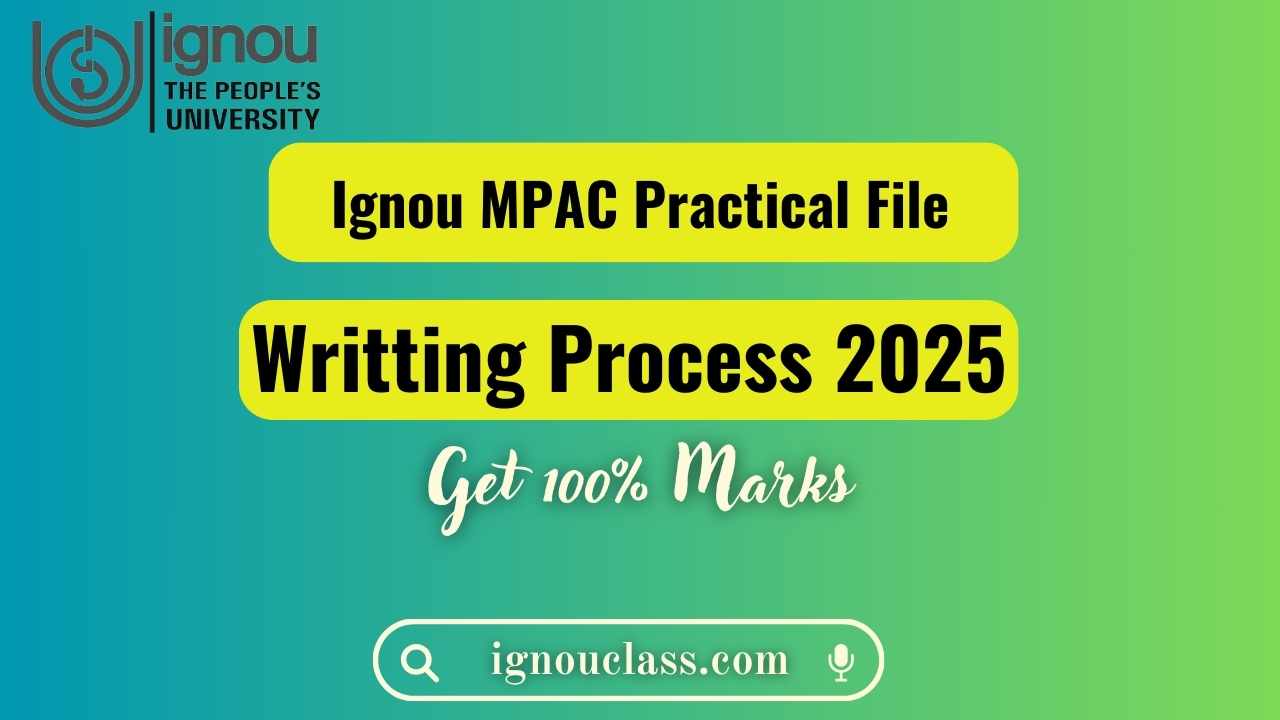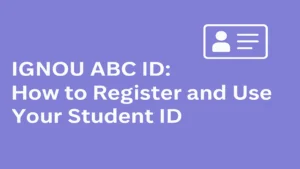Introduction
The IGNOU MAPC (Master of Arts in Psychology) program is a sought-after course for students aspiring to make a career in psychology. Known for its flexibility and rigorous curriculum, the program emphasizes both theoretical understanding and practical application. One of the most critical components of the MAPC 2nd year is the preparation of the practical file. This file plays a pivotal role in bridging theoretical knowledge with real-world applications, equipping students with the skills necessary for professional practice in psychology.
This article will provide a comprehensive guide to creating the IGNOU MAPC 2nd Year Practical File, covering its structure, components, tips for preparation, and evaluation criteria.
Overview of the IGNOU MAPC Practical File
The IGNOU MAPC (Master of Arts in Psychology) Practical File is a comprehensive document that showcases the practical work completed by students as part of their coursework. It typically includes:
- Introduction: A brief overview of the purpose and significance of the practical work in psychology.
- Practical Assignments: Descriptions of various practical exercises, experiments, or projects undertaken, detailing the objectives, methods, and findings.
- Observation Reports: Summaries of observations made during practical sessions, including case studies or fieldwork experiences.
- Data Analysis: Presentation of any data collected during experiments, along with statistical analysis and interpretation.
- Reflections and Conclusions: Personal reflections on the practical experiences, including what was learned and how it applies to theoretical concepts in psychology.
- References: A list of books, articles, and other resources used throughout the practical work.
The Practical File is an essential component of the MAPC program, demonstrating a student’s practical skills and understanding of psychological concepts.
Structure and Format of the Ignou MAPC Practical File
To ensure a well-organized and professional presentation, the practical file must adhere to a specific structure and format. Here’s a detailed breakdown:
Essential Sections in IGNOU MAPC 2nd Year Practical File
- Cover Page: Include essential details such as your name, enrollment number, course code, and practical file title.
- Table of Contents: Provide a clear index for easy navigation.
- Introduction: Write a brief overview of the experiments conducted and their objectives.
- Main Body: Detail the experiments, including methodology, data collection, and analysis.
- Conclusion: Summarize the outcomes and learning experiences.
- References and Bibliography: Cite all sources used, following the APA format.
Formatting Guidelines of IGNOU MAPC 2nd Year Practical File
- Use standard A4-sized paper.
- Maintain consistent font style and size (e.g., Times New Roman, 12 pt).
- Double-space the text for readability.
- Include visuals like graphs, tables, and charts where applicable.
- Ensure neatness and avoid unnecessary decorations.
Key Components of the IGNOU MAPC 2nd Year Practical File
Mandatory Experiments
The IGNOU MAPC 2nd Year Practical File syllabus includes a range of experiments, such as:
- Personality assessment using standardized tests.
- Intelligence testing and interpretation.
- Counseling techniques and mock therapy sessions.
- Case studies focusing on psychological disorders.
Observation and Data Collection
Accurate and detailed observation is the cornerstone of any psychological experiment. Record your findings meticulously, ensuring all variables are noted.
Analysis and Interpretation
Analyze the collected data using appropriate statistical tools. Provide interpretations that connect findings to relevant psychological theories.
Theoretical Background
Each experiment should include a theoretical framework explaining the relevance and purpose of the study. Link this framework to the concepts covered in your coursework.
Detailed Guide to Writing the IGNOU MAPC 2nd Year Practical File
Writing Experiment Reports
Each report should include the following:
- Introduction: Outline the purpose and hypothesis of the experiment.
- Methodology: Describe the tools, participants, and procedures used.
- Results: Present findings in an organized manner, using tables or graphs where necessary.
- Discussion: Interpret results and connect them to theoretical concepts.
Critical Reflection
Include a section for self-assessment, reflecting on the challenges faced and insights gained during the experiment.
Referencing Styles
Follow APA guidelines for citing sources. Examples include:
- Books: Author, A. A. (Year). Title. Publisher.
- Articles: Author, A. A. (Year). Title. Journal Name, Volume(Issue), Page Numbers.
Tips and Strategies for Completing IGNOU MAPC 2nd Year Practical File
Here are some tips and strategies for completing the IGNOU MAPC (Master of Arts in Psychology) 2nd Year Practical File:
1. Understand the Requirements:
- Review the syllabus to understand the specific requirements for the practical file.
- Note the types of practicals you need to complete and report on.
2. Organize Your Work:
- Create a clear structure for your practical file, including sections for each practical, introduction, methodology, results, discussion, and conclusion.
- Use dividers or tabs to easily navigate between different sections.
3. Follow Guidelines:
- Adhere strictly to the guidelines provided by IGNOU regarding formatting, length, and content.
- Make sure to include all necessary details as per the specifications.
4. Documentation:
- Keep thorough documentation of your practical activities, including observations, data collected, and any tools or methods used.
- Use charts and tables to present data clearly where applicable.
5. Reflective Analysis:
- Include a reflective section for each practical, discussing what you learned and how it relates to your coursework.
- Analyze results critically and discuss their significance.
6. Seek Feedback:
- Consider seeking feedback from peers or instructors on your practicals before final submission.
- Address any suggestions for improvement.
7. Time Management:
- Allocate time for each practical and adhere to a schedule to avoid last-minute rush.
- Break down tasks into manageable parts to maintain steady progress.
8. Preparation for Viva:
- If a viva is part of the assessment, prepare speaking points based on your practical files.
- Practice discussing your findings and methodology concisely.
9. Final Review:
- Before submission, review your entire practical file for coherence, clarity, and completeness.
- Check for spelling and grammatical errors.
By following these strategies, you can effectively complete your IGNOU MAPC 2nd Year Practical File and enhance your learning experience.
Importance of Adherence to IGNOU Guidelines For IGNOU MAPC 2nd Year Practical File
Adherence to IGNOU (Indira Gandhi National Open University) guidelines for the MAPC (Master of Arts in Psychology) 2nd year practical file is crucial for several reasons:
- Assessment Criteria: Following the guidelines ensures that your practical file meets the assessment criteria set by IGNOU. This can directly impact your grades and overall academic performance.
- Structured Presentation: The guidelines provide a structured format for your practical file, which helps in organizing your work systematically. A well-structured file is easier for evaluators to assess.
- Standardization: Compliance with the guidelines promotes standardization across submissions. This ensures fairness in evaluation as all students follow the same criteria.
- Reflects Professionalism: Adhering to the prescribed format reflects professionalism and attention to detail, qualities that are essential in the field of psychology.
- Enhanced Learning: Following the guidelines can enhance your learning experience by encouraging critical thinking and systematic documentation of your practical experiences.
In summary, adhering to IGNOU guidelines for the MAPC 2nd year practical file is essential for academic success, standardized assessment, professional presentation, and meaningful learning.
Common Challenges and Solutions
Time Constraints
Balancing coursework, practicals, and personal commitments can be challenging. Create a schedule to allocate dedicated time slots for working on the file.
Technical Issues
If you face difficulties accessing tools or resources, explore online alternatives or seek help from your study center.
Understanding Complex Concepts
For complex theories or methodologies, refer to IGNOU’s study material, attend workshops, or join student forums for support.
Role of Supervisors and Mentors
Supervisors and mentors play a vital role in preparing the IGNOU MAPC (Master of Arts in Psychology) 2nd Year Practical File. Here are key aspects of their contribution:
- Guidance on Content: Supervisors and mentors provide direction on what content to include, ensuring that students cover all necessary topics and adhere to IGNOU guidelines.
- Methodological Support: They assist in designing experiments or practical activities, helping students choose appropriate methodologies and data collection techniques.
- Feedback and Improvement: Regular feedback from supervisors allows students to refine their work, address any weaknesses, and enhance the overall quality of the practical file.
- Research Skills Development: Mentors can help students develop research skills, including data analysis, interpretation, and critical evaluation of findings.
- Emotional Support: The mentorship relationship can provide emotional support and motivation, helping students manage any stress or challenges during the preparation process.
- Preparation for Assessments: Supervisors can help students prepare for any viva or presentations related to their practical file, offering tips on effective communication and presentation skills.
In summary, supervisors and mentors are essential in guiding, supporting, and enriching the practical file preparation process for MAPC students, ultimately contributing to their academic success.
Submission Process of IGNOU MAPC 2nd Year Practical File
The submission process for the IGNOU MAPC (Master of Arts in Psychology) 2nd Year Practical File generally involves the following steps:
- Preparation of Practical File: Ensure your practical file is complete, including all required experiments, observations, and analyses as per the syllabus guidelines.
- Formatting: Follow the specified format for your practical file. Typically, it should include a cover page, table of contents, and organized sections for each practical.
- Documentation: Include a duly filled and signed assignment cover page if required. Maintain clarity and neatness in presentation.
- Submission Method:
- Hard Copy: Visit your designated regional center or study center to submit a hard copy of the practical file.
- Online Submission: If online submission is allowed, follow the instructions on the IGNOU website to upload your file as a PDF or other required formats.
- Deadlines: Be aware of and adhere to submission deadlines provided by IGNOU for the 2nd-year practical file.
- Confirmation: Once submitted, ensure to obtain a receipt or confirmation of submission for your records.
For the most accurate and current information, always refer to the official IGNOU website or your regional center guidelines.
Key Deadlines
Track submission deadlines carefully. Late submissions may result in penalties or disqualification.
Common Errors to Avoid
- Missing sections or incomplete data.
- Incorrect formatting or citations.
- Errors in personal details on the cover page.
Evaluation and Scoring Criteria For IGNOU MAPC 2nd Year Practical File
Evaluators assess practical files based on:
- Completeness: Inclusion of all required sections.
- Relevance: Alignment with the syllabus.
- Presentation: Neatness, organization, and clarity.
- Viva Voce: Ability to explain and defend your work.
Tools and Resources for Support
- Books and Manuals: Refer to IGNOU’s official study materials.
- Online Resources: Explore websites, videos, and forums for additional guidance.
- Sample Files: Use approved samples to understand formatting and content expectations.
Real-World Applications of the Practical Work
The skills developed during the practical work are invaluable in professional psychology. From conducting assessments to interpreting data, these competencies are essential for careers in clinical, counseling, and organizational psychology.
Importance of Ethics in Ignou MAPC Practical Work
Ethical considerations are paramount when conducting psychological experiments. Ensure:
- Confidentiality of participant data.
- Informed consent is obtained before conducting studies.
- Honesty in reporting findings and avoiding plagiarism.
Conclusion
The IGNOU MAPC 2nd Year Practical File is more than a mere academic requirement; it’s a stepping stone toward a successful career in psychology. By approaching it with dedication and attention to detail, you can gain invaluable insights and skills. Stay organized, seek help when needed, and adhere to IGNOU’s guidelines to ensure your practical file reflects the best of your abilities.
By following this guide, you’ll be well-prepared to create a comprehensive, well-structured, and impactful practical file, paving the way for academic success and professional growth.
What if a required tool is unavailable?
Seek guidance from your supervisor for alternative tools or methods.
Can experiments be done in groups?
Yes, but each student must submit an individual report.
How to handle incomplete data?
Address the issue in your analysis and discuss potential limitations.
Is it possible to revise and resubmit the file after feedback?
This depends on IGNOU’s policies and deadlines; consult your study center.
Related Posts:-
- IGNOU PhD Admission 2025: A Comprehensive Guide to Kickstart Your Research Journey
- IGNOU Exam Form 2025 For June Exam: Comprehensive Guide for Students
- IGNOU Assignment Last Date 2025: Comprehensive Guide for Students
- Download IGNOU Assignment Front Page 2024-2025
- Download IGNOU Assignment Front Page 2024-2025
- IGNOU Term End Result December 2024: A Comprehensive Guide for Students




